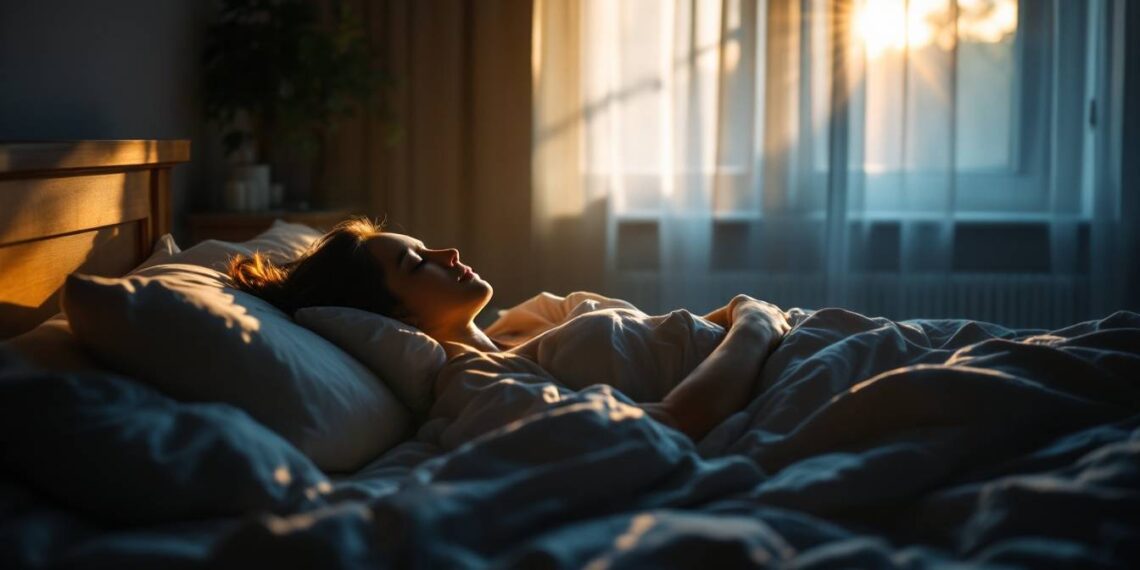Do you find yourself sleeping in late on weekends to catch up on lost sleep during the week? While it might seem like a good idea, inconsistent sleep patterns between weekdays and weekends can disrupt your body’s natural rhythms, leaving you feeling more tired and groggy. Striking a balance with your weekend sleep schedule is essential for maintaining overall health and well-being.
By understanding the impact of weekend sleep variations and implementing practical strategies, you can harmonize your sleep patterns and wake up refreshed every day of the week. Let’s explore how to achieve this balance and improve your overall sleep quality.
Key Takeaways
- Maintain Consistent Sleep Schedules: Keeping regular sleep and wake times—even on weekends—supports your body’s internal clock, enhancing sleep quality.
- Understand Circadian Rhythms: Disruptions to your natural 24-hour cycle can lead to sleep issues and daytime fatigue.
- Identify Lifestyle Impacts: Social activities, screen time, and irregular routines can negatively affect sleep patterns.
- Implement Weekend Sleep Strategies: Gradual adjustments and optimizing your sleep environment help balance weekend sleep.
- Practice Healthy Sleep Habits: Establish a relaxing bedtime routine and relaxation techniques to improve sleep consistency.
- Be Mindful of Technology Use: Reducing screen time before bed minimizes disruptions to your sleep cycle.
- Seek Professional Help When Needed: Persistent sleep problems may require consultation with a healthcare professional.
Cracking the Weekend Sleep Code
Weekend sleep patterns can really mess with how well you catch those z’s. Figuring out why keeping a steady sleep routine is key and learning how weekend hijinks can throw you off is crucial for getting better shut-eye.
Why Keep Sleep Steady?
Keeping your sleep schedule like clockwork isn’t just good—it’s a game changer for your health. Sticking to a regular bedtime each night keeps your body’s inner clock in check. This means you sleep more soundly and wake up feeling like you actually got some sleep, which is when all the magic repairs happen.
| Why Regular Sleep Rocks | What It Does for You |
|---|---|
| Better Mood Swings | Good sleep makes you less cranky. |
| Brain Power Up | Focus and smart choices are easier after solid sleep. |
| Healthy Body Vibes | Balances hormones and keeps your defenses strong. |
| Energy Boost | A steady schedule means you’re not nodding off at lunch. |
Keep sticking to that bedtime, and you’re bound to see improvements in your sleep game. For more ways to keep a steady snooze schedule, check our article on regular sleep tactics.

How Weekend Snoozes Shake Things Up
For many folks, weekends are a whole different ball game for sleep. Catching extra hours might sound smart, but staying up too late or hitting snooze all morning can throw your body’s clock off-balance. This can lead to a whole ‘social jetlag’ party where your body’s gears and your social life are out of sync.
| Weekend Sleep Woes | What’s Going Down |
|---|---|
| Tossing and Turning | Off-the-clock sleep can keep you spinning. |
| Drowsy Days | Funky sleep hours can drag you down. |
| Sleep Debt Pile-Up | Catching up on winks isn’t always a quick fix. |
| Moody Blues | Big shifts can mess with your mood. |
Finding that sweet spot between weekend fun and keeping your sleep in check is key. Come up with a weekend snooze plan to dodge these sleep traps. Look into setting up bedtime rituals with a wind-down routine, or unplug with a screen break for better sleep to get quality z’s.
A consistent sleep schedule isn’t just about getting enough sleep; it’s about syncing with your body’s natural rhythms for optimal health and well-being.” – Dr. Jessica Payne
Factors Influencing Sleep
Taming the chaos of sleep madness might just save your Saturdays and Sundays. Life quirks like body clocks doing their dance and weekend shenanigans have a lot to say about how much we snooze.
Circadian Rhythms
Your body’s inner time-keeper, the circadian rhythms, keep you in line with the sun. Like a boss, they tell you when to hit the sack and when to rise. It’s all about those little things like light and temperature. Keeping to a regular snooze schedule can make falling asleep feel like drifting into a soft, fluffy cloud, not just some weekday grind.
Circadian Rhythm Overview
| Factor | Description |
|---|---|
| Length | Basically 24 hours |
| Main Influences | Sunlight, room temp |
| Effects on Sleep | Controls when ya feel sleepy or perky |
Messing with your sleep-in schedule, say on a Sunday, can throw off your groove. You might find yourself staring at the ceiling on a Monday night, wondering why sleep’s ghosted you. So, sticking to a familiar bedtime scene really helps the week go smoother—reliability is your friend. For tips on setting your internal clock straight, look into maintaining a consistent sleep schedule.
Social and Lifestyle Factors
Late-night fun, catching up on work, or just life’s choices play a part in your sleep saga. Weekends might mean later nights, but watch out—it can mess with shut-eye. Stress, that one-too-many drink, or scrolling through memes at night, all play games with how deep you sleep.
Impact of Lifestyle on Sleep
| Factor | Impact on Sleep |
|---|---|
| Social Events | Partying till late pushes snooze time |
| Alcohol Consumption | Messes with your dreamy cycle |
| Technology Use | That screen glare says “bye-bye” to melatonin |
To combat these sleep bandits, make bedtime a sacred ritual. A chill pre-sleep routine, ditching the screens, and a little night-time unwind can work wonders. Get the full scoop on evening habits for better sleep or try a digital detox for sleep.
When you spot the clues of both ticking body clocks and lifestyle choices, you can nab the dream of perfect rest and wake up feeling like a champ. Keeping those healthy snooze habits from our sleep hygiene guide can turn sleep problems into sweet dreams.
Weekend Sleep Strategies
Nailing down effective weekend sleep habits is a game-changer for feeling good all around. Grab some tricks and tips to manage weekend snooze sessions like a pro, boosting that overall sleepy-time goodness.
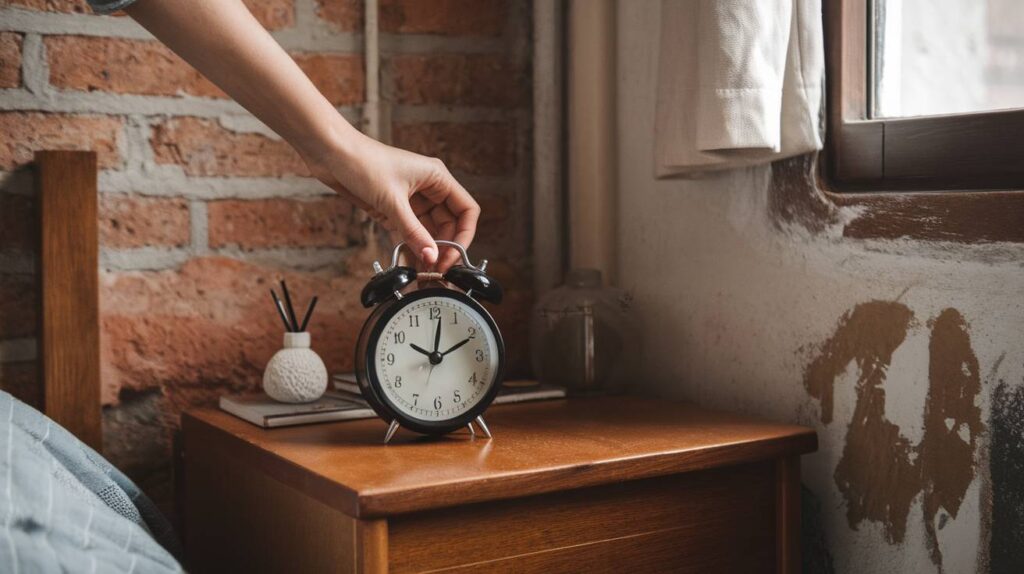
Taking it Slow
Jumping into big changes with sleep schedules on the weekend might land you in something called “social jetlag.” That’s when you’re shaking up your sleep time for those precious days off, then boomeranging back to the weekday shuffle. It’s like your sleep brain is stuck in two time zones. Ease into it with baby steps—it’s all about the slow and steady here:
- Tiny Tweaks: Shift your sleep and wake times just a smidge—like 15 to 30 minutes—over the weekend. Your snooze button will thank you eventually.
- Same Time, Different Day: Stick with a similar wake-up call, whether it’s Tuesday or Saturday. Keeps your body rhythm doing its thing.
| Day | Suggested Wake-up Time | Adjustment (minutes) |
|---|---|---|
| Monday | 7:00 AM | 0 |
| Tuesday | 7:00 AM | 0 |
| Wednesday | 7:00 AM | 0 |
| Thursday | 7:00 AM | 0 |
| Friday | 7:00 AM | 0 |
| Saturday | 7:30 AM | +30 |
| Sunday | 7:30 AM | +30 |
- Weekday Hootenannies: Got plans like a late-night get-together or movie marathon? Slot these into weekdays so your weekend clock doesn’t have to spin outta control.
Need more ways to keep your sleep on track? Peek at our consistent sleep schedule guide.
Sprucing Up Sleep Space
Making where you sleep as comfy as your favorite pair of jeans plays a big role in getting solid shut-eye—especially during weekends. Here’s the lowdown:
- Bedding Bliss: Make sure your mattress and pillows aren’t betraying you. Little tweaks like swapping to a fluffier pillow might just do wonders.
- Moody Vibe: Blackout curtains and some chill vibes can boost that melatonin magic. White noise machines are a plus if you need that calming hum. Ponder our article on white noise machines for sleep for options.
- Block Out Tech: Ban electronics from your snooze zone to crush that screen-time temptation. Unplug at least an hour before hitting the hay. Curious? Check out our take on digital detox for sleep.
- Keep it Cool: Aim for a room temp of 60°F to 67°F (15°C to 19°C) for prime sleeping conditions. Adjust your thermostat or snag a fan if you need to.
Follow these tips to conquer your weekend sleep game, all geared up towards nailing better sleep habits. Want to add a wind-down ritual? Don’t miss our read on pre-sleep routine.
Napping Guidelines
Catchin’ a few Z’s on the weekend might just be your secret weapon against that weekday sleep deficit. But, before you go snoozing the day away, a little know-how on napping could save you from nighttime tossin’ and turnin’.
Effects of Weekend Napping
Grabbing a nap on the weekend is a bit like a double-edged sword. Sure, you get that instant energy lift and feel like your mood’s done a 180. But, overdo it, and you might just find yourself staring at the ceiling come bedtime.
| Good Stuff | Not-So-Good Stuff |
|---|---|
| You’re wide awake and ready to tackle the world | Countin’ sheep takes forever |
| You’re Smiling Again | Nighttime sleep rhythm might go haywire |
| Brain’s firing on all cylinders | Waking up can feel like dragging through molasses |
Finding that sweet spot for nap time and length is key to reaping the benefits without the drawbacks.
Optimal Nap Duration
Not all naps are created equal. Research suggests a quick nap is usually your best bet. Here’s the lowdown on how long you should consider laying down:
| How Long? | What’s It Do? |
|---|---|
| 10-20 minutes | The famous “power nap” — gives you a zap of energy with no strings attached. |
| 30 minutes | Some light snooze; tends to leave ya feelin’ like a zombie. |
| 60 minutes | Gettin’ into deeper sleep; helps memory but might give you the groggy blues. |
| 90 minutes | Full sleep cycle; think creativity boost and happy memories. |
Pick your nap wisely, and you might just find yourself perkin’ up like never before. For more bedtime smarts, check out our sleep hygiene guide for some handy bedtime tricks.
Getting the hang of when and how long to nap will help you hit that weekend rest sweet spot, keeping you sharp and chipper all day long.
Healthy Sleep Habits
Getting your snooze groove on isn’t rocket science, but a few clever tricks can keep those weekend sleep blues at bay and give your well-being a boost. We’re talking about setting up a not-too-strict sleep routine and finding ways to chill out before hitting the hay.
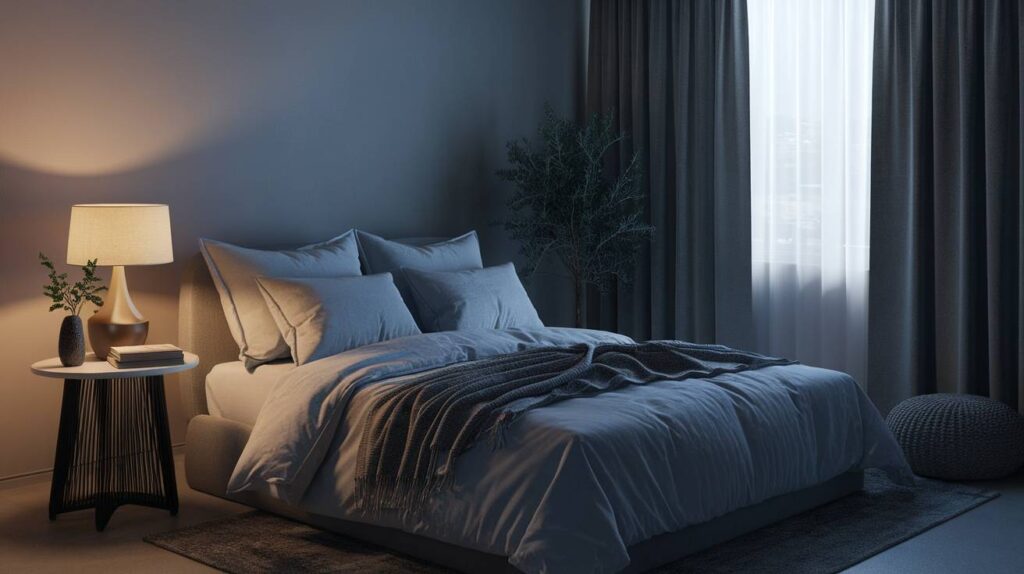
Creating a Sleep Routine
Think of your sleep routine as the body’s very own timetable. Being predictable with when you sleep and wake can make a world of difference. This holds true every day of the week, not just weekdays—weekends too! Here’s a little cheat sheet for sorting out your sleep routine:
| Elements of a Sleep Routine | Recommendations |
|---|---|
| Sleep Schedule | Keep your sleep and wake-up times steady, even when weekends roll around. |
| Pre-Sleep Rituals | Get into calming habits before bed. Check out some neat ideas here. |
| Limit Stimulants | Ease up on caffeine afternoons and nights. |
| Manage Light Exposure | Dim the lights as the day ends; swap screen time for a digital detox. |
| Create a Comfortable Environment | Your sleep space should be cool, dark, and whisper-quiet. White noise machines can help. |
Sticking to a regular timetable and winding down with pre-sleep habits gives you a better chance of catching quality Z’s, even when your weekend schedule’s all over the place. A sleep journal could be your secret weapon in figuring out your sleep groove.
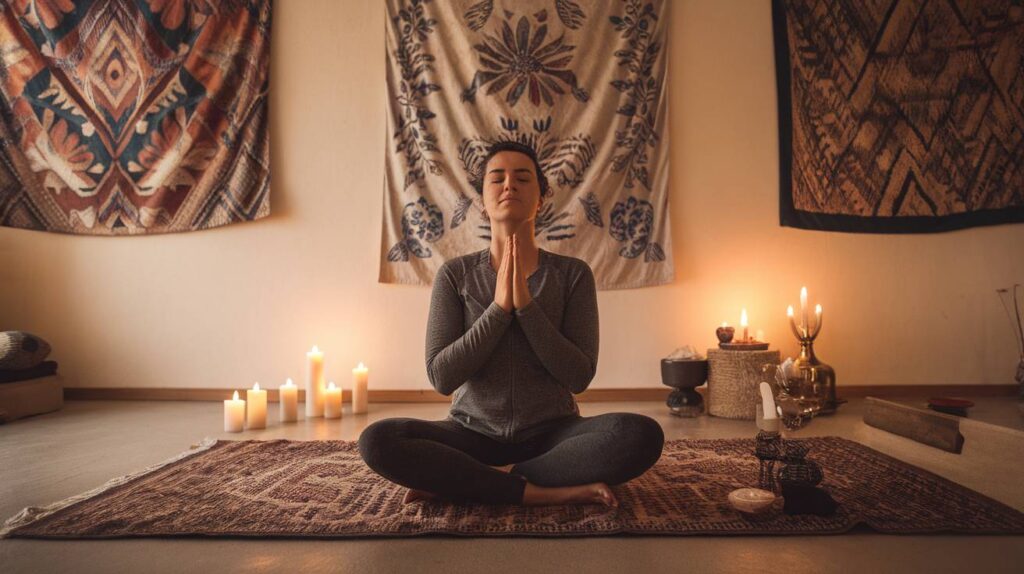
Relaxation Techniques for Better Sleep
Winding down before bed with some relaxation moves can really dial up your sleep quality. You’ve got plenty to choose from, and it’s all about what floats your boat. Check out these chill-out methods:
| Relaxation Technique | Description |
|---|---|
| 4-7-8 Breathing Technique | This deep-breathing gig goes like this: inhale for 4 counts, hold for 7, and let go in 8. Let it help your mind unwind. Get the lowdown here. |
| Meditation | Chilling with some meditation can zap stress. Explore apps designed for sleep to guide you through. |
| Gentle Stretching | Some easy-breezy stretching to loosen up tight muscles gets you prepped for bed. |
| Aromatherapy | Wafting sleepy-time scents like lavender may just help you chill out. |
Mixing these relaxation moves into your pre-sleep jam could unlock the door to a dreamy sleep. Regularly tuning into some of these practices can wipe away any sleep debt racked up over active weekends, setting you up for smoother weekend slumbers.
Laying down these healthy sleep habits is your ticket to a world where restful nights help you wake up refreshed and ready to own your day.
Technology and Sleep
We’ve got smartphones rather than alarm clocks, binge-watching series instead of bedtime stories, and endless scrolling instead of sweet dreams. But wait a minute, could tech be messing with our Z’s? Let’s break down how screen time might be playing night-time tag with our sleep patterns.
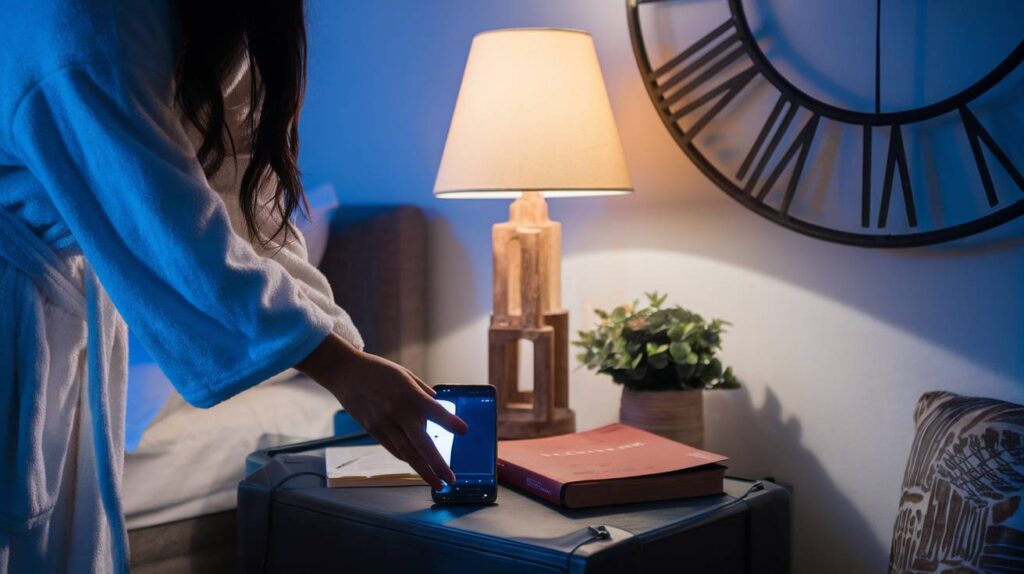
Screen Time Impact on Sleep
Too much screen time before bed is like caffeine in a digital disguise. Phones, tablets, and laptops are night owls with a blue light beam that does a sneaky dance with melatonin, our sleep potion. Studies show that marathons with bright screens can turn tossing and turning into an Olympic sport and make quality snooze elusive. Check out this flashlight on how screen times beam into our sleep routine:
| Screen Time Duration | Sleep Tango |
|---|---|
| Under 1 hour | Light jig with no big deal on sleep |
| 1-2 hours | The cha-cha starts, tinkering with melatonin |
| 2-3 hours | A real tango, making the pillow feel like a brick |
| 3 hours or more | The full dance party, leaving sleep quality biting the dust |
So, what’s the antidote? Step away from the glow before crashing. Grab a book or try some stretches to let your brain swap from a bright screen to bedtime mode. Curious for more night rituals? Our article on evening habits for better sleep has got ya covered!
Mindful Tech Use for Improved Sleep
Want to up your sleep game? Time to put some rules around those gadgets. Here’s the lowdown:
- Digital Switch-Off: Try kicking screens to the curb for a spell each night. A mini digital vacay can reset your circadian vibes. For some detox motivation, peek at our guide on digital detox for sleep.
- Bye-Bye Blue Light: Tap into your device’s night mode to dial down the blue light show. Your melatonin will thank you.
- Chill Rituals: Create a wind-down script for your brain. Mix some calming breaths or a light stretch to cue your system that it’s bedtime. Start with the simple 4-7-8 breathing technique for some pre-snooze zen.
- Silence the Buzz: Mute those notifications. Seriously, unless you’re on call for emergencies, let the world wait while you catch your winks.
When we dial down the tech stress, sleep becomes less of a nightcap and more of an old friend. Crafting a healthy tech routine is one step on the road to not just snoozing better, but living better. Wanna dive deeper? Explore some healthy sleep habits to transform your nights.
Getting a Little Help from the Sleep Pros
Figuring out when it’s time to holler for help is key in tackling those pesky sleep troubles. Nipping issues in the bud can work wonders for your weekend rest and general snooze quality.
When to Call In the Sleep Experts
If someone can’t seem to shake those restless nights, it’s time to think about seeing a sleep expert. Struggles like nodding off, waking up a zillion times, or being an early riser might mean it’s time to get some professional eyes on the problem. Here’s when you should definitely reach out:
| Symptoms | Should You See Someone? |
|---|---|
| Insomnia hanging around for more than three weeks | Yep |
| Feeling wiped out during the day | Yep |
| Snoring like a foghorn or breathing issues in your sleep | Yep |
| Known sleep problems (like sleep apnea) | Yep |
| Messing with daily life or mood | Yep |
Getting on top of sleep problems can do wonders for your health and mood. Jotting down sleep patterns and any nighttime shenanigans in a journal can be a big help when talking things over with a specialist.
What’s on the Sleep Fix Menu?
Once you’re in the expert zone, there are lots of fixes to consider based on what you need. Here’s a peek at some go-to remedies:
| Sleep Fix | What’s It All About? |
|---|---|
| Cognitive Behavioral Therapy for Insomnia (CBT-I) | Handy program that swaps out the thoughts and habits that mess with sleep. |
| Meds | Sleep meds might be on the table but handle with care—doctor’s orders only! |
| Sleep Hygiene 101 | Tips for sticking to a sleep schedule and jazzing up your sleep space. Dive into sleep hygiene tips here. |
| Tweaking Habits | Could mean more jogging or chilling with techniques like the 4-7-8 breathing trick for better rest. |
| Gadgets for Sleep Apnea | If sleep apnea’s in the mix, gizmos like CPAP machines or special mouthpieces might do the trick. |
Nailing down the signs of a sleepy situation and looping in an expert can smooth out those sleep hiccups and boost overall health. Looking for more on sleep routines? Don’t miss our article on healthy sleep habits.
Tips for Better Weekend Sleep
- Stick to a Sleep Schedule: Go to bed and wake up at the same times every day, including weekends.
- Create a Relaxing Bedtime Routine: Engage in calming activities like reading or taking a warm bath before bed.
- Limit Exposure to Screens: Avoid electronics at least one hour before bedtime to reduce blue light exposure.
- Manage Naps Wisely: If you nap, keep it short (20-30 minutes) and avoid late-afternoon naps.
- Optimize Your Sleep Environment: Ensure your bedroom is cool, dark, and quiet to promote better sleep.
- Be Mindful of Caffeine and Alcohol: Limit intake, especially in the hours leading up to bedtime.
Conclusion
Achieving harmony with your weekend sleep patterns is more than just a matter of discipline—it’s a commitment to your overall health. By understanding the effects of inconsistent sleep schedules and making intentional adjustments, you can enhance both your sleep quality and daytime energy levels. Embrace consistent sleep routines, create a sleep-friendly environment, and be mindful of technology use to pave the way for restful nights and vibrant days. Remember, if sleep issues persist, seeking professional guidance can help you uncover underlying problems and set you on the path to better sleep. After all, everyone deserves to wake up feeling refreshed and ready to embrace the day.
FAQs
Why is it important to maintain a consistent sleep schedule on weekends?
Keeping a regular sleep schedule helps regulate your body’s internal clock, improving sleep quality and daytime alertness. Inconsistent sleep patterns can disrupt circadian rhythms, leading to sleep problems and fatigue.
How can late nights on weekends affect my sleep?
Staying up late or sleeping in disrupts your natural sleep-wake cycle, causing “social jetlag.” This misalignment can make it harder to fall asleep on subsequent nights and lead to daytime sleepiness.
What strategies can help balance my weekend sleep schedule?
Gradually adjust your sleep times, create a relaxing sleep environment, and practice healthy sleep habits like a consistent bedtime routine. Limiting naps and being mindful of screen time before bed can also help.
How does screen time before bed impact sleep?
Exposure to screens emits blue light, which can suppress melatonin production, the hormone that regulates sleep. This can make it harder to fall asleep and reduce sleep quality.
When should I consult a healthcare professional about my sleep issues?
If you experience persistent sleep problems, such as difficulty falling asleep, staying asleep, or excessive daytime sleepiness that affects daily functioning, it’s advisable to seek professional guidance.
Resources
- Sleep Foundation – Understanding Circadian Rhythms
- Harvard Health Publishing – Blue Light Has a Dark Side
- Mayo Clinic – Sleep Tips: 7 Steps to Better Sleep

